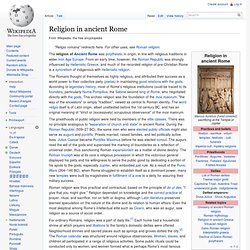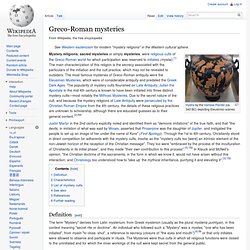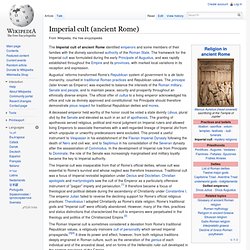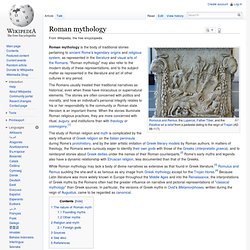

Religion in ancient Rome. The religion of Ancient Rome was polytheistic in origin, in line with religious traditions in wider Iron Age Europe.

From an early time, however, the Roman Republic was strongly influenced by Hellenistic Greece, and much of the recorded religion of pre-Christian Rome is a syncretism of indigenous with Hellenistic religion. Roman religion was thus practical and contractual, based on the principle of do ut des, "I give that you might give. " Religion depended on knowledge and the correct practice of prayer, ritual, and sacrifice, not on faith or dogma, although Latin literature preserves learned speculation on the nature of the divine and its relation to human affairs.
Even the most skeptical among Rome's intellectual elite such as Cicero, who was an augur, saw religion as a source of social order. For ordinary Romans, religion was a part of daily life.[1] Each home had a household shrine at which prayers and libations to the family's domestic deities were offered. Roman deities[edit] Roman festivals. Greco-Roman mysteries. See Western esotericism for modern "mystery religions" in the Western cultural sphere.

Definition[edit] The term "Mystery" derives from Latin mysterium, from Greek mysterion (usually as the plural mysteria μυστήρια), in this context meaning "secret rite or doctrine". An individual who followed such a "Mystery" was a mystes, "one who has been initiated", from myein "to close, shut", a reference to secrecy (closure of "the eyes and mouth")[4]:56 or that only initiates were allowed to observe and participate in rituals. The Mysteries were thus cults in which all religious functions were closed to the uninitiated and for which the inner workings of the cult were kept secret from the general public. Characteristics[edit] Mystery religions form one of three types of Hellenistic religion, the others being the imperial cult or ethnic religion particular to a nation or state, and the philosophic religions such as Neoplatonism.
Mysteries thus supplement rather than compete with civil religion. Imperial cult (ancient Rome) Augustus' reforms transformed Rome's Republican system of government to a de facto monarchy, couched in traditional Roman practices and Republican values.

The princeps (later known as Emperor) was expected to balance the interests of the Roman military, Senate and people, and to maintain peace, security and prosperity throughout an ethnically diverse empire. The official offer of cultus to a living emperor acknowledged his office and rule as divinely approved and constitutional: his Principate should therefore demonstrate pious respect for traditional Republican deities and mores. A deceased emperor held worthy of the honor could be voted a state divinity (divus, plural divi) by the Senate and elevated as such in an act of apotheosis. The granting of apotheosis served religious, political and moral judgment on Imperial rulers and allowed living Emperors to associate themselves with a well-regarded lineage of Imperial divi from which unpopular or unworthy predecessors were excluded.
Roman mythology. Roman mythology is the body of traditional stories pertaining to ancient Rome's legendary origins and religious system, as represented in the literature and visual arts of the Romans.

"Roman mythology" may also refer to the modern study of these representations, and to the subject matter as represented in the literature and art of other cultures in any period. The Romans usually treated their traditional narratives as historical, even when these have miraculous or supernatural elements. The stories are often concerned with politics and morality, and how an individual's personal integrity relates to his or her responsibility to the community or Roman state. Heroism is an important theme.
When the stories illuminate Roman religious practices, they are more concerned with ritual, augury, and institutions than with theology or cosmogony.[1] The nature of Roman myth[edit] Founding myths[edit] Other myths[edit] Mucius Scaevola in the Presence of Lars Porsenna (early 1640s) by Matthias Stom.